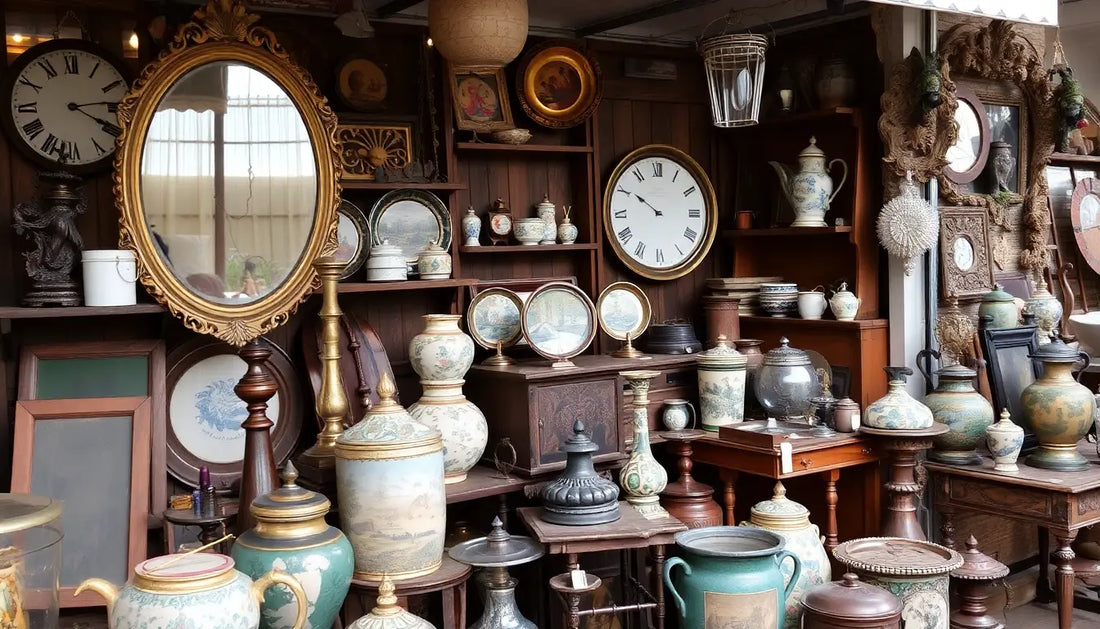
Antique Markets Today: Where to Find the Best Pieces and Unique Stories for Collectors
Introduction to Antiques
Antiques is a fascinating world that attracts collectors and history buffs. Every piece has a story to tell, and often, antiques are linked to significant moments in our culture and society. Antique markets offer the opportunity to discover unique pieces, each with its own story to tell. In this article, we will explore where to find the best antique markets and how to recognize valuable pieces, as well as some curiosities and practical advice for collectors.
Where to Find the Best Antique Markets
If you are an antiques enthusiast, it is essential to know where to look. Here are some of the best options for discovering markets and specialized fairs:
- Local Fairs and Markets: Every town has its own weekly or monthly markets where vendors display their pieces. These events are a great way to find rare items. Check local calendars for special events dedicated to antiques.
- Antique Shops: Small shops specializing in antiques can offer a curated selection of valuable items. Often, the owners are experts and can share interesting stories about the pieces, as well as advice on how to best preserve them.
- Online: Platforms like eBay and Etsy have sections dedicated to antiques, where you can find rare items from all over the world. In addition, there are sites specialized in antiques that can offer high-quality pieces with guarantees of authenticity.
- Antique Fairs: Attending antique fairs is a great opportunity to discover a wide variety of pieces and meet other collectors. Events like the Arezzo Antique Fair or the Mercante in Fiera in Milan are a favorite for enthusiasts.
- Collectors Groups and Associations: Joining a collectors group can provide valuable information about markets and fairs. Collectors meetings are also a great opportunity to exchange ideas and pieces.
Types of Parts to Look for
When you visit an antiques market, it helps to know what types of pieces you might find. Here are some categories that attract collectors' attention:
- Antique Furniture: From solid wood tables to vintage chairs, antique furniture can add character to any space and is often sought after for its quality craftsmanship.
- Art and Paintings: Old master paintings, prints and sculptures can be valuable pieces, both financially and historically. Provenance is crucial to determining the value of these objects.
- Vintage Jewelry: Antique or vintage jewelry is not only beautiful to wear, but can also be a significant investment. Pay attention to the brands and the quality of the materials.
- Collectibles: Coins, stamps, vintage toys and other collectibles can be found at flea markets and are often sought after by avid collectors.
- Ceramics and Porcelain: Antique plates, vases and glassware can be both decorative and functional. The quality of the material and the brand can affect the value.
How to Recognize Valuable Pieces
Not all antiques have the same value. Here are some tips to recognize valuable pieces:
- Provenance: The history and provenance of a piece can greatly influence its value. Documents of authenticity can make a difference. Always ask about the provenance of the piece.
- Condition: The overall condition of the item is paramount. Pieces in excellent condition are generally more sought after. Check for any repairs and wear.
- Artist or Designer: Items made by well-known artists or designers tend to hold or increase in value over time. Research the name of the artist or designer and check their reputation.
- Rarity: Rare or limited production items are often more valuable to collectors. Scarcity can be a key indicator of a piece's value.
- Labeling and Markings: Check for labels, marks or signatures that can attest to the authenticity and value of the piece.
Tips for Responsible Collecting
If you are just starting your adventure in the world of antiques, here are some tips for responsible collecting:
- Do Research: Before you buy, learn about the pieces and the artists. Knowledge is power, and knowing what to look for will help you make smarter purchases.
- Set a Budget: Antiques can be expensive. Set a budget to avoid impulse spending and help you make wiser decisions.
- Network with Other Collectors: Connecting with other collectors can provide opportunities to exchange pieces and valuable information. Attend events and trade shows to network.
- Avoid Impulse Buying: Take your time to evaluate a piece before purchasing it. Sometimes, the best pieces take time to find and appreciate.
- Document Your Acquisitions: Keep a record of your purchases, including photos, prices, and provenance details. This can be helpful for your collection and future sales.
Conservation of Antique Pieces
Once you have found the pieces you want, their preservation is crucial to maintaining their value. Here are some tips:
- Controlled Environment: Store items in a temperature and humidity controlled environment to prevent damage. Avoid exposure to direct light and heat sources.
- Gentle Cleaning: Use non-invasive cleaning methods to maintain the integrity of the object. If you are unsure, consult a restoration expert.
- Limited Display: Limit exposure to direct light to prevent fading and deterioration. Use display cases or protective containers for more delicate pieces.
- Regular Monitoring: Check your parts periodically for signs of deterioration or damage. Early intervention can make a difference in their preservation.
Conclusion
Antique markets are a treasure trove for collectors and history lovers. Knowing where to look and how to recognize valuable pieces is essential to building a meaningful collection. Don't forget to enjoy the process of discovery and listen to the stories each piece has to tell. Each object can become a part of your personal history, making collecting not only a hobby, but also a journey through time.






